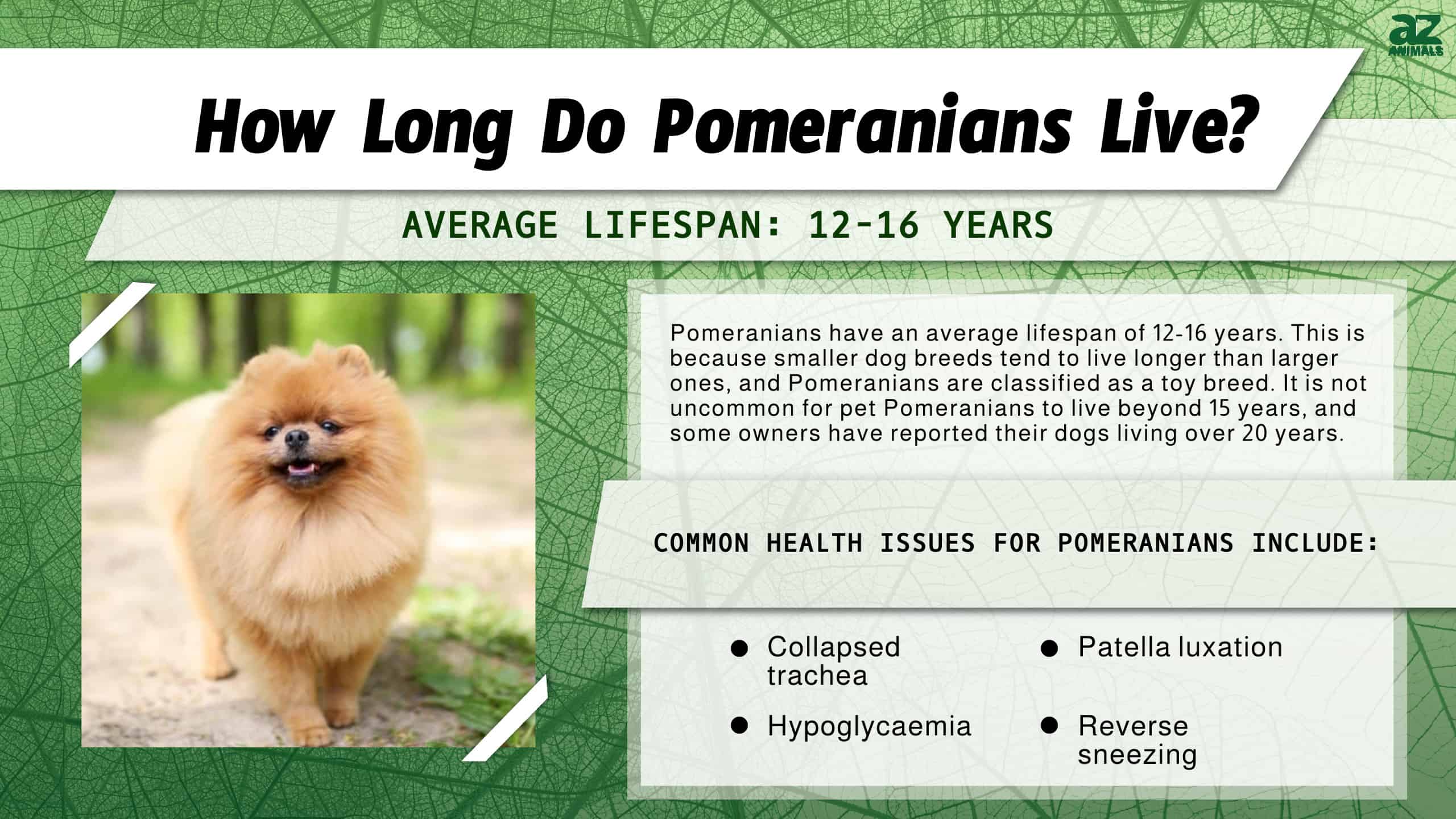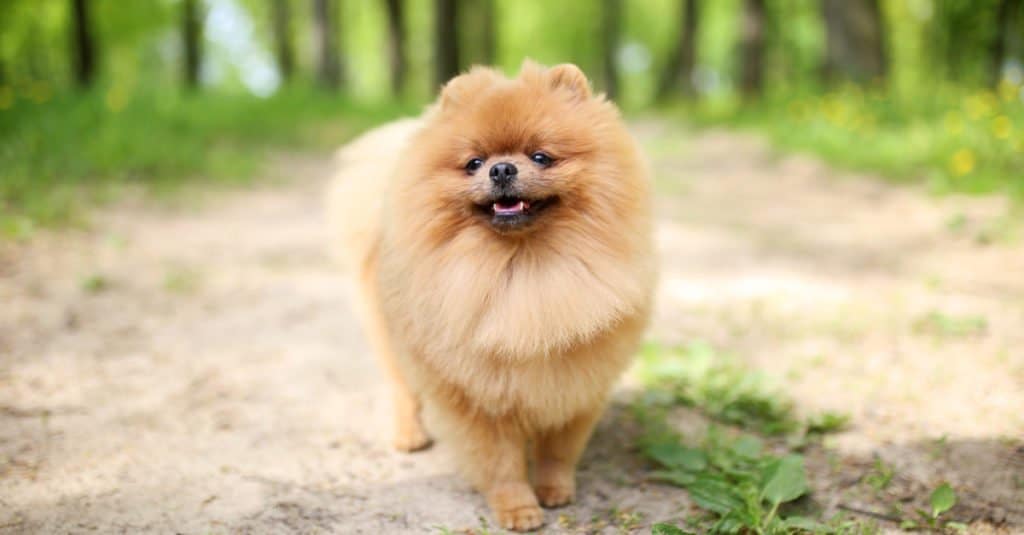
An extremely popular breed of toy dog, Pomeranians are known for being playful, vocal, and generally friendly. Today we are going to answer the question “how long do Pomeranians live?” We will also discuss what can you can expect out of the average Pomeranian lifecycle.
In this article, we will discuss how long Pomeranians live, as well as what you can do to extend the life of your pet Pomeranian puppy, no matter the age that you adopt. This is one ball of energy that deserves all the love and care in the world! Let’s get down to the business of discussing how long Pomeranians live.

An extremely popular breed of toy dog, Pomeranians are known for being playful, vocal, and generally friendly.
©pattarawat/Shutterstock.com
How Long Do Pomeranians Live?
Pomeranians live an average of 12-16 years. This is largely due to the fact that small dogs live longer than large dogs, and Pomeranians are a toy breed. Your pet Pomeranian may also live beyond 15 years, and many pet owners report their dogs living over 20 years as well.
However, it is important to keep a few key things in mind when considering your Pomeranian’s life span. Many Pomeranians pass away due to trauma, either from being accidentally dropped or stepped on, as well as car accidents and other unfortunate situations.
Given the size of this particular dog breed, you should take extra care when owning or interacting with a Pomeranian. While they aren’t necessarily delicate dogs, they are built for residential comfort and a gentle hand.
But what do Pomeranians go through, from birth to old age? Let’s discuss the average life cycle of a Pomeranian now.

©KristinaSh/Shutterstock.com
The Average Pomeranian Life Cycle
Whether you are expecting a new litter of Pomeranian puppies or are simply curious as to what newborn dogs go through, you’re in the right place. Here is what a Pomeranian goes through, long before you adopt your new family member.
Newborn
Like all other dog breeds, Pomeranian puppies are born without the use of any of their senses. This includes their sight, smell, hearing, and touch. They are completely reliant on their mother for everything, including relieving themselves.
After the first two weeks of being born, most Pomeranians have gained the use of the majority of their senses, including taste and smell. Some may need more time before they are able to hear, but they should be able to feed from their mother on their own at this point.
It is important to note that, due to their size, Pomeranian newborns need to be kept warm and comfortable. Their fur will not come in for a few weeks, and Pomeranian puppies should be closely monitored for the first four weeks of their life.
Young Puppies

The average Pomeranian is far too delicate and small to wrestle with large dogs at the dog park.
©Eve Photography/Shutterstock.com
After the first 4 weeks, most young Pomeranian puppies are curious, playful, and eager to learn. They are quickly learning the difference between humans and their littermates, and they are pesky little cuties at any age.
After 2 months, many Pomeranian puppies are adopted into homes. It is important that they are properly socialized, both with humans and other dogs, as this breed is easily fearful and traumatized. They enjoy playing and eating solid foods at this time as well.
Adult Pomeranians
Adult Pomeranians are adults after they have reached sexual maturity. Given the size of this toy breed, Pomeranians often reach this point between 8 to 12 months of age. Toy dog breeds reach adulthood much faster than larger breeds of dogs.
Adult Pomeranians are often stubborn and curious, needing consistent training and affection. Given their size, it is important to still keep your Pomeranian warm and comfortable indoors, even if it has grown in its magnificent and fluffy coat.
Your Pomeranian will likely mellow out after the age of six or seven years old. This is a more senior dog age for the majority of dog breeds, though Pomeranians will often live another six or seven years without any medical issues.

Pomeranians are well known for their beautiful fur and fluffy coats, but it does need routine grooming and maintenance in order to look it’s best.
©pattarawat/Shutterstock.com
How to Extend the Life of Your Pet Pomeranian
No matter the age of your pet Pomeranian, you may be wondering how you can help extend the life of your new family member. There are many steps you can take, and here are some of the top things you can do to help with your Pomeranian’s life span.
- Keep your Pomeranian on a strict diet. All small dog breeds are more likely to gain weight faster due to their size and treat motivation. Your pet Pomeranian will thank you if you are able to maintain a set feeding schedule and diet. Many Pomeranians also suffer from sensitive stomachs and tracheal issues. This means you should pay special attention to what they eat, especially as mischievous puppies.
- Make sure your Pomeranian exercises safely. The average Pomeranian is far too delicate and small to wrestle with large dogs at the dog park. However, they still require exercise and dedicated play time. Make sure that your Pomeranian received this in a safe and comfortable environment, so that they don’t experience unnecessary pain or trauma.
- See a veterinarian regularly. Your pet Pomeranian will no doubt benefit from a vet that they see routinely. The same veterinarian should see your Pomeranian if possible, so that they get to know your pet just as well as you do. They are your first line of defense for preventing disease.
- Keep your Pomeranian’s coat clean. Pomeranians have beautiful fur and fluffy coats. However, it needs routine grooming and maintenance in order to look it’s best. You should have your Pomeranian’s nails trimmed and teeth brushed regularly as well. Gum health is one of the most important things for any dog parent to consider.
The photo featured at the top of this post is © pattarawat/Shutterstock.com
Ready to discover the top 10 cutest dog breeds in the entire world?
How about the fastest dogs, the largest dogs and those that are -- quite frankly -- just the kindest dogs on the planet? Each day, AZ Animals sends out lists just like this to our thousands of email subscribers. And the best part? It's FREE. Join today by entering your email below.
Thank you for reading! Have some feedback for us? Contact the AZ Animals editorial team.






